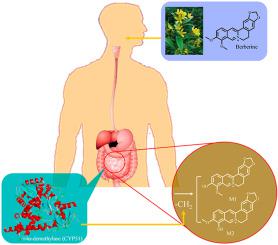Journal of Pharmaceutical Analysis ( IF 6.1 ) Pub Date : 2020-10-14 , DOI: 10.1016/j.jpha.2020.10.001 Zheng-Wei Zhang 1 , Lin Cong 1 , Ran Peng 1 , Pei Han 1 , Shu-Rong Ma 1 , Li-Bin Pan 1 , Jie Fu 1 , Hang Yu 1 , Yan Wang 1 , Jian-Dong Jiang 1

|
Berberine (BBR) is an isoquinoline alkaloid extracted from Coptis chinensis that improves diabetes, hyperlipidemia and inflammation. Due to the low oral bioavailability of BBR, its mechanism of action is closely related to the gut microbiota. This study focused on the CYP51 enzyme of intestinal bacteria to elucidate a new mechanism of BBR transformation by demethylation in the gut microbiota through multiple analytical techniques. First, the docking of BBR and CYP51 was performed; then, the pharmacokinetics of BBR was determined in ICR mice in vivo, and the metabolism of BBR in the liver, kidney, gut microbiota and single bacterial strains was examined in vitro. Moreover, 16S rRNA analysis of ICR mouse feces indicated the relationship between BBR and the gut microbiota. Finally, recombinant E. coli containing cyp51 gene was constructed and the CYP51 enzyme lysate was induced to express. The metabolic characteristics of BBR were analyzed in the CYP51 enzyme lysate system. The results showed that CYP51 in the gut microbiota could bind stably with BBR, and the addition of voriconazole (a specific inhibitor of CYP51) slowed down the metabolism of BBR, which prevented the production of the demethylated metabolites thalifendine and berberrubine. This study demonstrated that CYP51 promoted the demethylation of BBR and enhanced its intestinal absorption, providing a new method for studying the metabolic transformation mechanism of isoquinoline alkaloids in vivo.
中文翻译:

肠道微生物群中 CYP51 酶将小檗碱转化为其去甲基化代谢物
黄连素 (BBR) 是一种从黄连中提取的异喹啉生物碱,可改善糖尿病、高脂血症和炎症。由于 BBR 的口服生物利用度低,其作用机制与肠道微生物群密切相关。本研究侧重于肠道细菌的 CYP51 酶,通过多种分析技术阐明肠道微生物群中去甲基化 BBR 转化的新机制。首先进行BBR与CYP51的对接;然后,在体内测定了 BBR 在 ICR 小鼠中的药代动力学,并在体外检查了 BBR 在肝脏、肾脏、肠道微生物群和单一菌株中的代谢。此外,ICR 小鼠粪便的 16S rRNA 分析表明 BBR 与肠道微生物群之间存在关系。最后,重组大肠杆菌含有构建cyp51基因并诱导CYP51酶裂解物表达。在CYP51酶裂解系统中分析BBR的代谢特征。结果表明,肠道菌群中的 CYP51 可以与 BBR 稳定结合,伏立康唑(CYP51 的特异性抑制剂)的加入减慢了 BBR 的代谢,从而阻止了去甲基化代谢物 thalifendine 和小檗碱的产生。本研究表明CYP51促进BBR去甲基化并增强其肠道吸收,为研究异喹啉生物碱在体内的代谢转化机制提供了新方法。











































 京公网安备 11010802027423号
京公网安备 11010802027423号